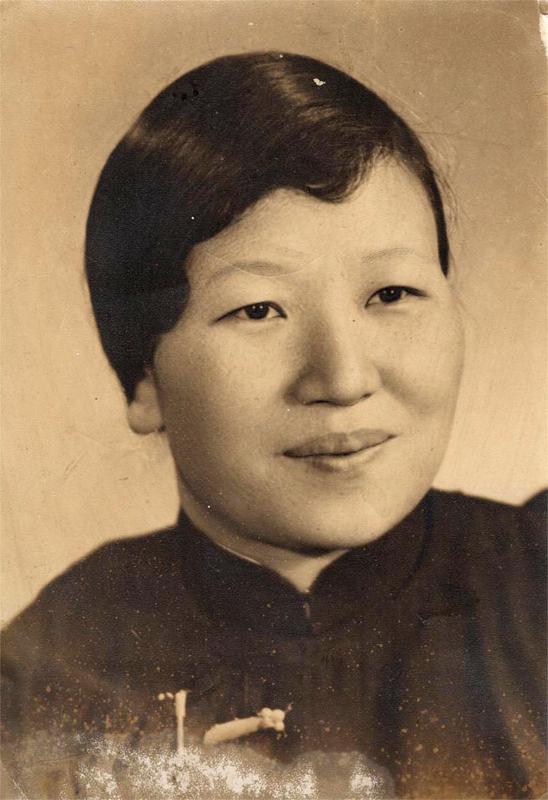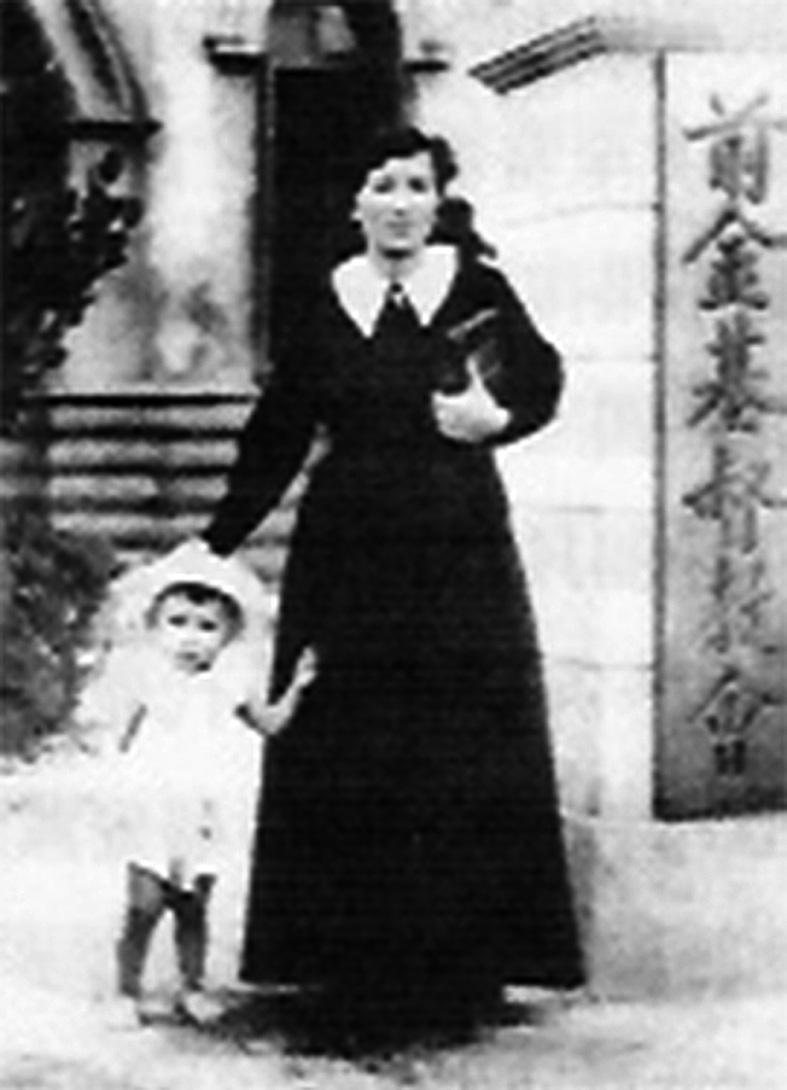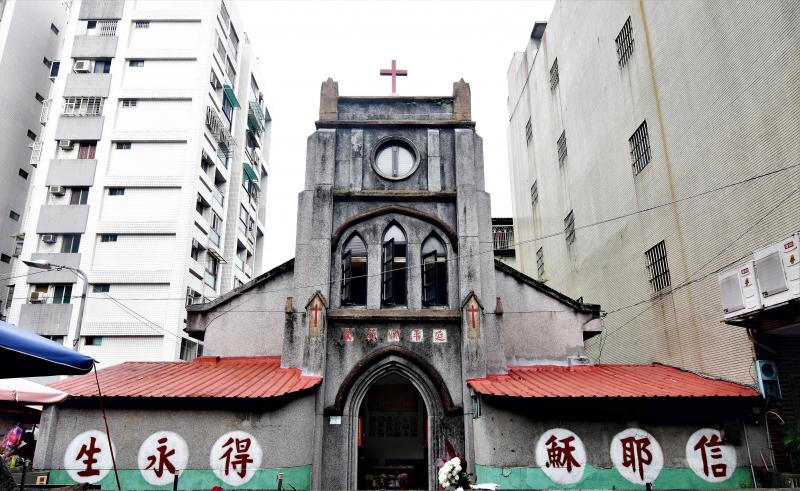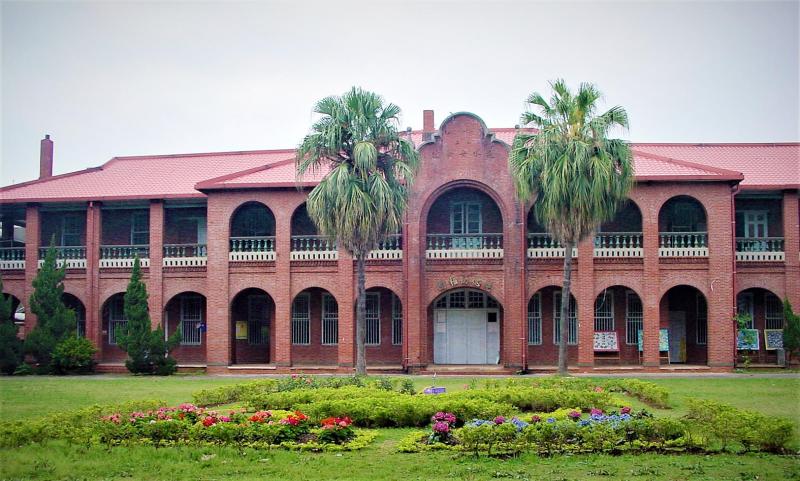Sept 27 to Oct 3
When an apparition appeared in a vision telling Easter Lee (李幫助) to build a seminary, she said she would only do so if three conditions were met — conditions that were nearly impossible to meet for a woman born in 1909 to a modest family with 22 children.
Still bitter about nearly having to give up her schooling for her younger brother, the ambitious 18-year-old wanted to cancel her arranged marriage, attend seminary school abroad and become Taiwan’s first female pastor.

Photo courtesy of Qianjin Presbyterian Church
Lee accomplished all three before she turned 40, reaching the final milestone in March 1949 at Kaohsiung’s Qianjin Presbyterian Church (前金長老教會), which she had helped establish three years earlier.
In 1953, she fulfilled her promise by founding today’s Tao-sheng Theological Seminary (道生神學院). Through the school’s institutions, she sought to advance women’s education and rights, while she also tackled social problems such as the often-abusive foster daughter system. After moving the seminary to Taipei, she started her quest to build 100 churches with the launch of the Yuanping Dawson Presbyterian Church (延平教會) in 1957. She founded seven more Tao-sheng affiliated churches during the 1970s.
Lee’s mission was cut short in 1989 by a stroke that left her bedridden for the last eight years of her life. She died in 1997, but her family donated her savings to help her fulfill one more goal by opening the Dao Sheng Assisted Living Facility in 2011 on the seminary grounds.

Photo courtesy of Wikimedia Commons
RELIGIOUS TRAINING
Lee was born to a Buddhist fishing family in today’s Shezidao (社子島) area. Her mother contracted tetanus when she was pregnant with Lee, and sought treatment at the nearby Mackay Clinic in Tamsui where she was introduced to Christianity.
After recovering, she attended Canadian missionary William Gauld’s sermons and eventually the entire family converted to the religion before Lee’s birth.

Photo courtesy of Wikimedia Commons
Per the common custom then, Lee was betrothed when she was 11 years old. She still received an education, enrolling at the age of 15 in the missionary-run nursing program at Tamsui Girls’ School. But after a financial setback to the family, her mother asked her to drop out so that they could afford to send her younger brother to teacher’s college.
Lee recalls asking why they favored her brother’s education, and her mother replied: “Even if our daughter is well-educated, she’ll eventually marry and have children and become part of another person’s family. That is not the case with sons, and we hope that you can accept our arrangement.”
Lee begged them to let her finish the semester, and even contemplated suicide if they refused. Her parents eventually relented, and she worked at Mackay Memorial Hospital for a few years until her “vision” set her on a different course. It’s unclear how she got out of her arranged marriage, but she says in her biography that it felt like she regained her freedom.

Photo courtesy of Wikimedia Commons
She completed theology classes while working as a nurse, and “prayed day and night” for the chance to study abroad. It finally happened in 1934, when the church recommended her to today’s China Bible Seminary in Shanghai, which was then an all-women’s institution.
Upon graduating in 1936, Lee served as a missionary in Quanzhou, Fujian Province until the Second Sino-Japanese War broke out the following year and she was jailed under suspicion of spying for the Japanese. She headed to British Malaya after the English Presbyterian Mission negotiated her release and returned home in 1941.
Ironically, she was also imprisoned for several months by the Japanese after her return for collaborating with Western powers due to her work sheltering widows, children and other disadvantaged people at the Tamsui mission.
CHARISMASTIC LEADER
Lee helped establish the Qianjin Presbyterian Church in Kaohsiung in 1946, and was serving there when the 228 Incident — an anti-government uprising that was violently suppressed — broke out the next year. She turned the church into a temporary clinic for the many wounded and also helped to retrieve dead bodies and conduct burials because men were afraid to go outside.
After three years at Qianjin, Lee made history when Tainan Theological College and Seminary president W. E. Montgomery ordained her into the church. According to a National Museum of Taiwan History entry, many religious leaders initially disapproved of Lee due to her gender, but she proved to be a charismatic speaker who quickly attracted a following with her “gentle, warm but magnetic” sermon style. By the time Lee moved on in 1954 to focus on her seminary, the church had expanded to Siaogang (小港) and boasted over 500 members.
Lee started the first iteration of the Tao-sheng seminary in 1953 with temporary headquarters at the Qianjin church. She moved the school to Taipei the following year, and after several moves it was established on its current grounds in Beitou District.
In 1957, she established the Yuanping Dawson Presbyterian Church in Taipei’s Dadaocheng area. The distinct building was erected in 1937 by Taiwanese followers of the Japan Holiness Church, and Lee raised funds to renovate it after World War II.
Lee only got busier over the years, handling pastoral duties for several years at Taipei’s Christian New Life Mission (新生教會). She began expanding the Tao-sheng brand in 1974, opening seven directly affiliated churches during that decade.
Lee’s grand-nephew Lee Jen-hao (李仁豪) recalls in an article in The New Messenger (新使者雜誌) that she made her last public appearance at his wedding in 1989, soon suffering a debilitating stroke that left her unable to speak.
The younger Lee writes that the family knew of his grand-aunt’s wishes to open an assisted living center, and despite the project stalling for over a decade, it finally happened in 2011.
As for her dream to build 100 churches? “That’s the tougher one, and we can only do our best,” Lee Jen-hao writes.
Taiwan in Time, a column about Taiwan’s history that is published every Sunday, spotlights important or interesting events around the nation that either have anniversaries this week or are tied to current events.

Last week, on the heels of the recall election that turned out so badly for Taiwan, came the news that US President Donald Trump had blocked the transit of President William Lai (賴清德) through the US on his way to Latin America. A few days later the international media reported that in June a scheduled visit by Minister of National Defense Wellington Koo (顧立雄) for high level meetings was canceled by the US after China’s President Xi Jinping (習近平) asked Trump to curb US engagement with Taiwan during a June phone call. The cancellation of Lai’s transit was a gaudy

Following the shock complete failure of all the recall votes against Chinese Nationalist Party (KMT) lawmakers on July 26, pan-blue supporters and the Chinese Communist Party (CCP) were giddy with victory. A notable exception was KMT Chairman Eric Chu (朱立倫), who knew better. At a press conference on July 29, he bowed deeply in gratitude to the voters and said the recalls were “not about which party won or lost, but were a great victory for the Taiwanese voters.” The entire recall process was a disaster for both the KMT and the Democratic Progressive Party (DPP). The only bright spot for

From Godzilla’s fiery atomic breath to post-apocalyptic anime and harrowing depictions of radiation sickness, the influence of the nuclear bombings of Hiroshima and Nagasaki runs deep in Japanese popular culture. In the 80 years since the World War II attacks, stories of destruction and mutation have been fused with fears around natural disasters and, more recently, the Fukushima crisis. Classic manga and anime series Astro Boy is called “Mighty Atom” in Japanese, while city-leveling explosions loom large in other titles such as Akira, Neon Genesis Evangelion and Attack on Titan. “Living through tremendous pain” and overcoming trauma is a recurrent theme in Japan’s

As last month dawned, the Democratic Progressive Party (DPP) was in a good position. The recall campaigns had strong momentum, polling showed many Chinese Nationalist Party (KMT) lawmakers at risk of recall and even the KMT was bracing for losing seats while facing a tsunami of voter fraud investigations. Polling pointed to some of the recalls being a lock for victory. Though in most districts the majority was against recalling their lawmaker, among voters “definitely” planning to vote, there were double-digit margins in favor of recall in at least five districts, with three districts near or above 20 percent in